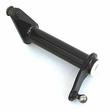|
Throttle Coupler
Old 911, 912 cars have a poorly designed in-line coupler attached to
the end of the throttle rod. It is rubber and deteriorates over time.
Mine had sever cracks in it as you can see in one of the pictures
below. The difficulty in repair comes when you discover that the
coupler is frozen to the rod. I broke the throttle rod end trying to
remove it.
To get at the parts rather than trying to fix this problem with the
rod in the car, I removed the rod - starting at the gas pedal and
working back - and discovered there are a couple (I found 2, the parts
book shows a usage of 3) of plastic guides that keep the rod suspended
in the tunnel. These have to be replaced - they are falling apart.
They are not expensive - a few dollars each, but my car doesn't go all
that well if you remove the throttle rod.
I am amazed at the number of plastic and rubber parts on this car. I
guess after nearly 35 years it is not surprising to find they have not
stood up that well.

| Here is the throttle bell crank when I started this project. As
expected the original plastic bushings were completely gone. I
ordered some brass replacements, but they are for a later design with
smaller dimensions. Factory plastic were used instead of the brass
ones.
|

| The bell crank after removal and cleanup. Next comes primer and paint.
|

| The rubber throttle coupler and connecting ball end fitting. The new
rubber coupler is covered with a tube, such that if the rubber coupler
were to break, the throttle would still work partially.
|

| Coupler showing that it is beginning to come apart. If it were to
break, the car would be disabled. This is a good item to check on any
old 900 series car.
|

| For the price of a new throttle rod, I rescued the old one by buying a
set of taps and dies. The threads were cleaned up with the new tools.
|

| Here is the new rubber coupler encased in an open ended metal can. If
the rubber were to break, the throttle would still work although not
at 100%.
|

| The throttle bell cranks was cleaned up, repainted and the new plastic
bushings pressed in the ends.
|

| The plastic guides keep the throttle rod from sagging in the tunnel.
Any droop could cause some surging if the rod drooped while going over
a bump. A bouncing throttle rod would effectively shorten the rod
briefly, adding gas to the carburetors.
|

| Here is the completed project that you can contrast with the initial
picture and the cracked coupler.
|
Last modified: Sun, 18 Mar 2001
Links
|





